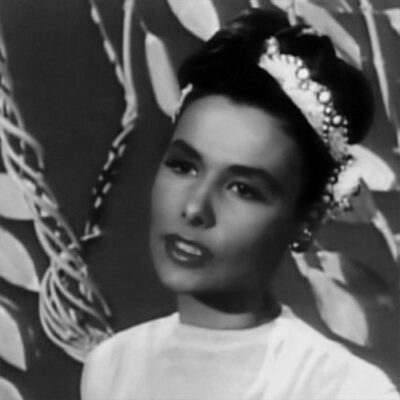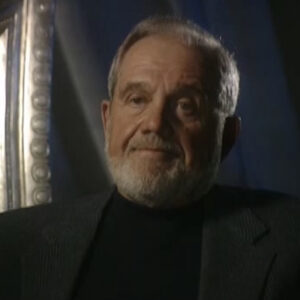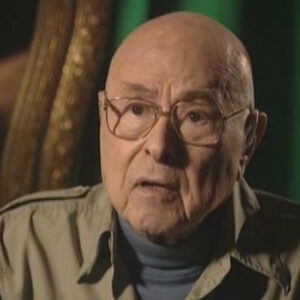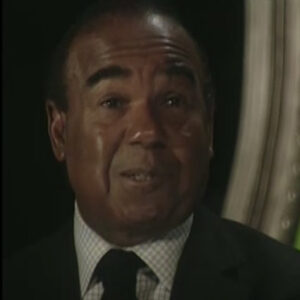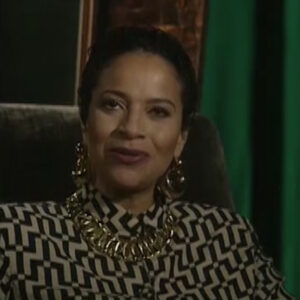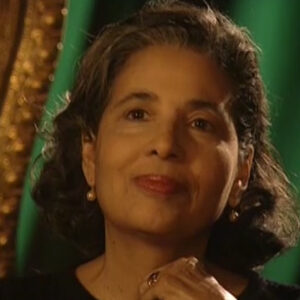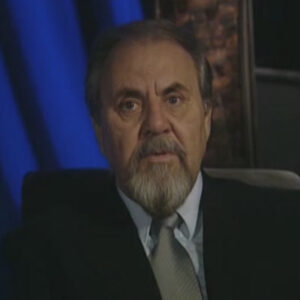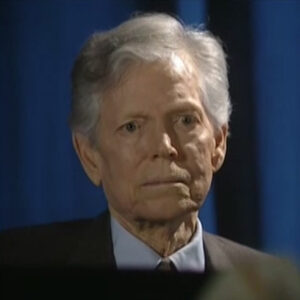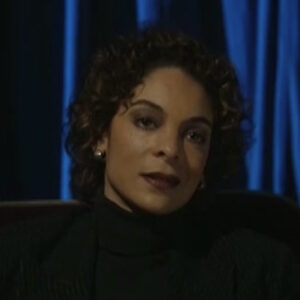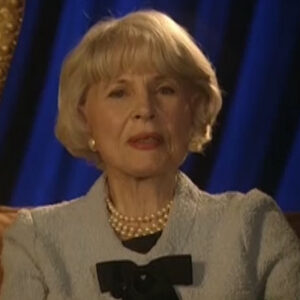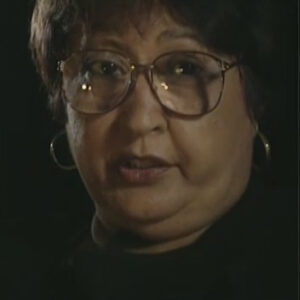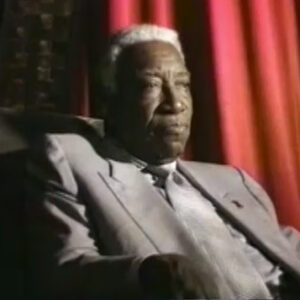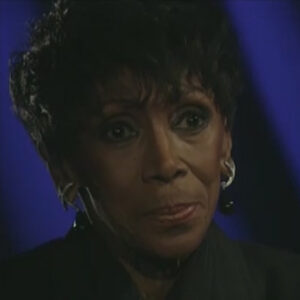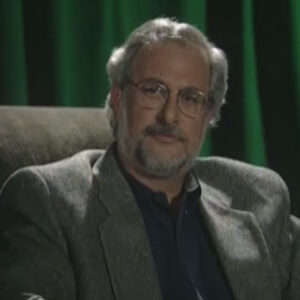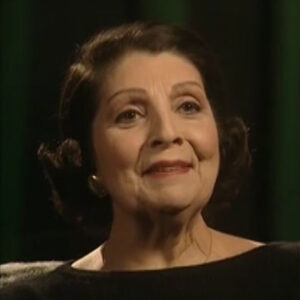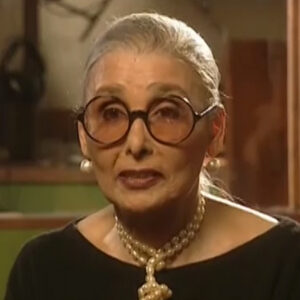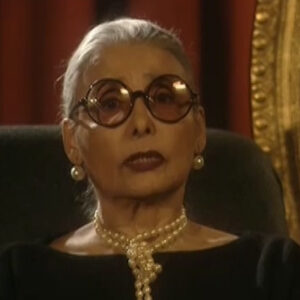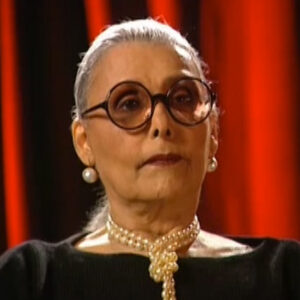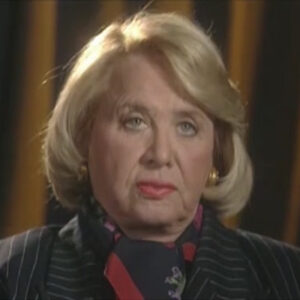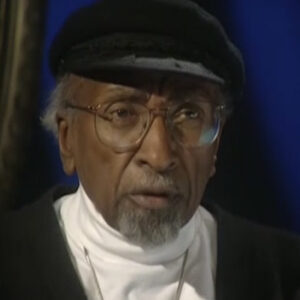Speaker I would like to go back to your 16th birthday. Tell me what your gift was.
Speaker Well, on my 16th birthday, Lena Horne was at the Waldorf Astoria and it was part of her farewell performances, as a matter of fact.
Speaker And as my birthday gift, my parents took me to see her.
Speaker And I have to say, it was probably the greatest of influences on me with regards to the business that I am now in, which is show business that has ever taken place. I think that and that was probably one of the best gifts I’ve ever gotten.
Speaker What was so special about this performer?
Speaker Oh, my watching Lena Horne then, and even to this very day, there was a majestic command of those boards, that stage she she was on.
Speaker You knew that she was in command from the very moment she walked on to the last bow and the way she moved. I mean, absolutely. Even the most divine people in the world to look at. And from a vocal point of view as well, doing what she was doing, I had not heard anybody doing that kind of thing better. It was just one of those indelible prints that was made on the blueprint of wherever it was that I have gone to thus far.
Speaker Now, you say farewell performances. When was this and what why was she saying farewell? Do you remember?
Speaker I you know, I don’t remember. She she said farewell a couple of times or maybe three or four times because I went to the next one, which was at the Sands Hotel in Las Vegas quite a few years later. I haven’t the slightest clue as to why she was exiting the business at that time, but I guess she felt that she needed that period of time that lapsed between then and the sands when I saw her next to do what she had to do emotionally, mentally, just getting it together, I guess, was the performance was where her performance was in Vegas different from, let’s say, her performance at the wall?
Speaker No, not really her. She’s been pretty consistent, I think, every time I’ve seen her. Anyway, I know what to expect and I get it.
Speaker I get 100 percent of Lena Horne and her choices of song choices, of movement, of choices, of lighting arrangements. It’s always Lena. So when you go to see the diva Sakala or Mamma, you’re going to get it and you’re going to get 100 percent of her.
Speaker Now, when you were in London, you went to see her and you had a big surprise waiting for you backstage.
Speaker Yes, I did. That was wonderful. I’d done a television show and had been informed.
Speaker Let me start again. If you could give me the time and the place. Yeah.
Speaker 1960, when I was in 1960, I was six, something like that.
Speaker OK, if you could start off.
Speaker It was in London around 1965, 66, thereabouts. And I was doing a television show and I was informed that Lena Horne was in town. And I said, well, obviously we’re going to make reservations. We can definitely go. And the young man who was doing the show with me as well, his name is Sasha Dishtowel, said it would be wonderful if he and his friends could go along with us. So we made reservations and we got to a place called The Talk of the Town, which is no unfortunately no longer exists. But we had dinner and we were talking about who she is, Lena Horne, and the contribution she’s made, et cetera, et cetera. And during the course of conversation, Sasha said to me, obviously, you’re going to go backstage. And I said, oh, definitely is this well, let’s make a pact here so that we’re not backstage forever and ever and ever. If she happens to say, I have every recording I’ve ever made, we will say thank you very much for that wonderful performance and we’ll leave it just because that happens to be the M.O. of most of our superstars. So I said, OK, I’m the problem with that. I went backstage and Lenny Hayton, who was her husband and also our conductor arranger at the time, was performing with her, greeted us at the dressing room area, had to sit in an area where she was going to receive our company. And we were sitting there just kind of talking back and forth. And I had worked with Lenny and Valley of the Dolls. He was the music coordinator for MGM Records. Movies at the time, so we had a lot to reminisce about and and works Lena and she sat on the corner of a chair that Lenny was sitting in and we were how much we enjoyed the show. I introduced the decision to it and the other people that were with us. As a matter of fact, Kathryn did this as well. And she was very cordial to everybody. And she said it and you pointing at me and said, Yes, ma’am. She says, I have every record you’ve ever made. Well, I really kind of stunned me. And I my heart just fell to my stomach. And I looked over at Sasha and he looked at me. She said, And you don’t believe me? I said, Well, it’s not that I don’t believe. She says, I not only know your hits. She said, I know your balms, too, and proceeded to tell me them. And she said, I not only know that, but I know you’re gone to Paris and you’re going to be at the Olympia Theater and then they’re going to go. So I go so-and-so. And I said there with my mouth open. And it did me so much, you know, just gave me such a good warm feeling to look over Sasha, you know, like her hair. I was just floored that this lady knew as much about me as she did and cared as much about what she did. She went on to discuss the fact that she followed my career and how I was walking in the right steps and that she would be always there for me, you know, just nice, warm, terrific relation. And I’ve never forgotten it. And I certainly hope that she hasn’t.
Speaker You know what I would love to do? One of the things that you said that she had said to me, if we could just go back to that, you’re starting from how she’s followed my career. I know that I know where you’re going to go and where you know.
Speaker And you’re basically saying that I not only know about your recordings, I know that you’re going to Paris and you’re going to be at the Olympia. I know where you’re going after you leave Paris and a few other places after that even, which made me feel terrific. And she says, I followed your career. I’ve watched the way you handle it, the the steps you’re making. And it makes me feel good to let you know that you’re one of my children. So I’ll keep my eye on you. And believe me, he has.
Speaker What is what is it that you call or sometimes mammo of time that I feel very privileged to be able to call her mama and my mother was very, very possessive of her children that there were only two people that I was allowed to refer to as mama. And she Lena is one and Marlene Dietrich was the other. The only two ladies that my mother said, OK, well, allow that for just a minute.
Speaker You know, as long as we understand who is mama, Marlene Dietrich and Lena’s name has often arisen in the same sentence at times.
Speaker Now, why is Marlene had the same kind of an effect on me?
Speaker Burt Bacharach was her conductor for many, many years.
Speaker And my first trip to Paris to perform at the Olympia was one that I was anticipating with a great deal of excitement is my birth and a little brown bomber for me. Start New Jersey. Gone to Paris, Byrd had telegrammed her and let her know that the baby was on the way, you know, and take care of her. And that’s exactly what he did. I mean, she met me at the airplane, took care of getting my luggage taken out of there. She from the tarmac, actually, I got into a car with my late Dietrick, was driven to my hotel. She checked me and we went to the Olympia theater. She did my sound check that, my lady, she did my orchestra rehearsal and then walked me into my dressing room to look at my clothes. And as she proceeded to throw everything almost into the hall, I looked at the woman like she was pregnant. You must remember, I’m just out of my teens and I’m from East New Jersey.
Speaker So being diplomatic was not high on my list of priorities and I kind of was ready to attack this woman. What are you doing? There are my clothes in the hall on the floor. She said, well, first of all, you call these things gowns. I said, of course, they’re very, very proud of my wardrobe. She says, so let me give you a couple of instances. She says, first of all, a gown is to touch the floor. This is no way in the world. Touched the floor. They must cover your shoes. Said, Oh, OK. I said so in the interim, what am I supposed to do to perform it? He says, You’re going to come with me. And he introduced me to couture, matched his demise and the chagrin of my accounting firm. But she did. And my first Balenciaga was given to me by Marlene Dietrich. And from that point to this, I know nothing less and nothing, nor should I feel I should.
Speaker No one is thinking about that. Let’s talk about how you study your your note.
Speaker I wish I had it in there like.
Speaker Right.
Speaker OK, tell me about your system of study, and I know you did this with llena and other folks, so I, I used to go to class, I called it, and basically I would go and see people who have been in the business for years and years and years, many more than I had time. And that were at a point in their careers and working in places that I eventually wanted to work in. And I literally would take a yellow legal pad and go sit in the back of the Persian room and watch Diahann Carroll and Eartha KITT. I go to the Waldorf, I watch Johnny Mathis, I watch Lena Horne go back three days and watch Ella Fitzgerald and Sarah Vaughan and Carmen McRae and I go to the Copa, see Sammy Davis Jr. and Frank Sinatra. And I mean, the list of places that I would go if my car could get me there with my pad and pencil, I would be there in the shadows, taking notes, watching how they moved on stage, listening to what they said before a song, how they would set up a song, their choices of material, how they relate it to an audience. And I think that I learned very well. Lena, as I said in the very beginning, was a major influence on me and how she handled that stage, what she said, how she walked in her appearance, just her that command. And those are the things that really Dahlby I and cross the T and all these people that I mentioned.
Speaker And I ask you, sorry, did you just say that part of you and you said, as I’ve said before, and that’s always a no no, because we can’t I mean, I thought what you said before, I just thought Lena was a little was a major influence in my classes.
Speaker Just the mere fact of how she walked out on the stage the first time you saw her, what she had on, what she said to the audience, how the choice of songs, any movement at all. She made the things that she said between songs to set up the next song made a great difference in the way that I perform and the things I say and the way I look and the way I feel I command my stage.
Speaker So I’d have to say that she was one of my major professors.
Speaker Now, what role do you feel Lenny hadn’t played in her? Personally, I believe that Lenny was.
Speaker Her backbone, and he was there with that baton behind her, he was there when she made a mistake and only he and he knew about it. He turned around probably and give him a wink or saying, OK, one for the girl from you know, I think he was a comfort zone. And knowing that if she missed a phrase, it would matter to him because he was going to go straight ahead as if nothing had ever happened. So like I said, only he or she would know that. And they loved each other, you know, and that means an awful lot when you got somebody out there has got you back. And he had it not only musically on a professional level, but obviously personally.
Speaker Now, do you remember from the Time song in 1965 when she did the leading music?
Speaker What was it? Was there a change in her? I mean, when you saw the lady in her music, what did you think?
Speaker I saw Lena Horne that I had never seen before when she was doing The Lady in her music. I saw a lady who was enjoying every second that she was on that stage. She was giving you Lena Horne and Toto. She was funny. She was enormously energetic. She was doing things that I wouldn’t even attempt to do. I loved her references to people like Aretha Franklin and Tina Turner and and imitating them in a fashion that you just wouldn’t expect Lena Horne to do the way that she made the little steps with the dancers, her interactions with her orchestra and soloists, and the way she introduced everybody on that stage that made that show happen. It was just another kind of a Lena Horne. It was someone who finally said, you know what, I’m gonna enjoy myself now. I’ve worked enough. Now I’m going to enjoy the fruits of my labor.
Speaker Now, this this happened after a whole series of tragedies.
Speaker Yeah, were you around with her at all when during that period when she lost her father, her son?
Speaker Yes. I was just recently in and out of her life during this period of time. And they were very difficult for her because they were major parts of her life, having lost three men, her husband, her father and her son. That takes an awful lot out of you. And I think that was also a period of time where she took another sabbatical, where she went up to Santa Barbara, intended her garden and just kind of hung out there and got to know Lena again and was relaxing and enjoying her life. And I don’t think he changed with regards to her respect or honor for the business, because as a parent, you know, that still will emerge whenever she has that stage. But she’s a human being to you know, most of us lose sight of the fact that we in the industry are as human as the next person. Those people who say the show must go on had to be an agent, a manager or somebody else dead, you know, without any regard for the fact that, you know, we we have problems just like everybody else. I mean, there are days we are together with a toothache or a headache or had an argument with our spouse or our loved ones or just plain flat out don’t feel like doing it, you know? And we, unfortunately, are in a business that we can’t call in sick. You know, I was on my deathbed and that’s when it’s accepted. I think her regard for this industry and her dedication to it also taught me a lesson that we go until we just can’t go any longer and when we can’t go any longer and we say, you know what, I got to take some time. And I think during that period of time is when she felt it was me time.
Speaker And up until that time, Lina had played roles for a lot of different people.
Speaker You know, she had, you know, played the strong the she was the role model for a lot of. And often she couldn’t really be the full thing.
Speaker Oh, did you get it? Did you ever get a sense of that in terms of the person that she presented to the public, the person she presented on the stage versus the person that we then saw in the lead in her music? Did you ever get a feeling for that?
Speaker I I guess I’m one of the few who happened to be very fortunate to know Lena on a personal level as well as a professional level. And I I guess I don’t know if I’m the right one to ask that question, because I always see Lena when she’s on stage and or off. Obviously, there’s a level of professionalism that goes with going on any stage at any time. But she never loses sight of who she is backstage. Obviously, we we can say eight, you know, and she says eight on stage. Do I think the sense of her that I happen to have personally might be a little different than somebody else that doesn’t know or as well as I do, or for the length of time that I’ve known her or I’ve had the opportunity to be in her company, not only because she’s performing somewhere. I’ve had dinner with her. She’s been in my home. She loves my children. I know her grandchildren very well. I know her daughter. So this is another kind of relationship that we have. And in so far as being a role model, she’ll always be a role model or something. Unfortunately, she can’t get away from. She’s been looked at by me and by so many others as the person that I would most like to not only imitate but emanate in my persona when dealing with people on whatever level has to be dealt with. And it’s a very difficult role to play. And I fortunately am smart enough to understand that she cannot be all things to all people. She has to be a human being, too. So there’s going to be those moments of frailties and of mistakes that that’s only human. And if you’re not bright enough to understand those things or put such a charge on people that they have to be one way all the time, then that’s not being fair. But she will unfortunately always be that role model that so many of us who are already in the industry and those who are bright enough to understand that that’s the image we all want or should be will look for, look for her to portray.
Speaker Oh, when you were as you were growing up, you know, what was the image? What was your mother, a fan of hers?
Speaker Yes, my family my entire family were fans of Lena Horne star in my house. Musically, it ran the gamut of music. My family had gospel singers. So obviously I know 99 percent of every single gospel singer that ever breathed a breath or sang a note. We also listened to B.B. King. We listened to Nat King Cole. We listen to Lena Horne, Ella Fitzgerald, Billie Holiday, literally, John Big Maybelle. I mean, just ran the gamut. My cousins who were recording artists at the time, the Monotones Records Book of Love. So, you know, we had a wide range of music within our homes. And Lena Horne was very much a part of that. I had the privilege of calling Sarah Vaughan Aunt Sassy. My mother went to school with her. They got the hair done, the same hairdresser. So I’ve been a very fortunate young lady in that I’ve been exposed to people in this industry who were not only megastars, but were mega human beings and were so warm and wonderful to me. I was known as the baby and they treated me that way and they noticed me that way. And they gave me information that I would normally not get any. Where else and to this very day, I hope it’s taken an effect in my person, in the way that I perform the information that I am able to impart to others who ask for it.
Speaker Tell me about the performance you remember.
Speaker I mean, the movie I’m trying to remember. Thank God it’s been so long as I’ve not looked at any old films and so long, but the one with believe it was Bojangles.
Speaker I’m sorry. So. And how flashy would you say that again?
Speaker I just I remember doing whether I remember the film Stormy Weather and what really affected me more than anything else about it was half laugh. She was I mean, she was just just flat. And there some other things that I remember very vividly about her, where it was during the year, somewhere around 1967, 68, 69, those that period of time where she received an honor from the Black Disc Jockeys Convention. And I presented it to her. And in her acceptance speech at the end of it, she says, I was wondering what took you so long to, first of all, realize I was the recording artist that you could play and most importantly, that you could honor. And similar instances at the Ice Cap Awards, where Hal David, the lyricist that wrote every single word that I’ve ever sung, was being honored by ASKAP. And I was presenting the award at that time. And her comment, in essence, was where were all all songwriters when I needed you?
Speaker You know, that was her her kind of way of putting the knife in and turning a couple of notches, let you feel her presence, which was obviously taken with the fun of which he threw it out there, but with the urgency of which he meant it. So I have tried almost to pattern the not so nice situations that I had to deal with in that fashion where I can kind of poke fun at what’s being done, but give you the very seriousness of it all and make the statement that has to be me.
Speaker Did you see her acceptance of that special, Tony? No, I didn’t. OK, now word has it that you were backstage at the ladies room just about every time we were in town.
Speaker Is this true? That’s true. Yes. I go backstage to see momma anytime I am where she is just getting a hug and I know how she’s doing and what’s new in her life. And yeah, girl talk. And if there is something that I’m doing that she needs to know about where she feels, she needs to know that everything I’m doing anyway, I believe in all new things that are happening in my life and some of the things I want to do. And we discuss those things, too. So it’s like me going home and talking to my own flesh and blood.
Speaker Now, what do you think is the best piece of professional advice she’s ever given?
Speaker I think probably be you.
Speaker And she always tells me that be yourself, just be who you are and the rest takes care of itself.
Speaker Could you tell me that one more time?
Speaker But just preface it with, you know, the best thing she’s ever told me or the best piece of advice I’ve ever got.
Speaker I guess if you want to call it advice, I don’t look at things that people share with me as advice. I look at it as information that I will obviously have to use. And the best one of the better pieces of information she’s ever said to me was very early on in my career when she said, Just be you, be yourself at all times on stage, off stage be you. And the rest takes care of itself.
Speaker I think I have covered it, but let me just check some.
Speaker One of the things I just like to do it again, because it may not be as clear on the night that you said when you made the pact. Well, if she says, I’ve heard everything, I read her record chorded. You know, one of the things that you said to me we were discussing it is that you put it in the context because that meant she would be phony. If you could just tell me that.
Speaker Oh, sure. Yeah. Sasha and I had sat at the table after the performance of this whole thing outside. Like everybody knows, this session is right. Sasha is the guy that Sasha Jazztel and I who were sitting across from each other at the table at the talk of the town, and he said, obviously, you’re going to go backstage. And I said, yes. He says, well, let’s make this this promise to each other. If we go backstage and she says to you, I have every record I’ve ever made, that we will then say, thank you very much for a wonderful performance and we’ll get up and leave. Because in our industry, usually when we’re greeted by superstars especially, and that stuff comes out of their mouths, it usually is a bit of that showbiz phoniness, you know.
Speaker Yeah, girl, I saw your last performance and it was bad because they have been nowhere near the stage or the place that we were playing. So when she said that I have every record you ever had, my whole heart just left me. I really did. It went right to my stomach. I was I was hurt. And I never believed that Lena Horne would ever say anything like that to me. And then when she came back with because obviously she saw the look on my face. Obviously, you don’t believe me. I not only know your hit, I know your balls. And she went on to name my albums, which really kind of, you know, I guess is a feeling that that cannot be explained. But it was one of major relief and gave me an opportunity to look at such and say they’re.

